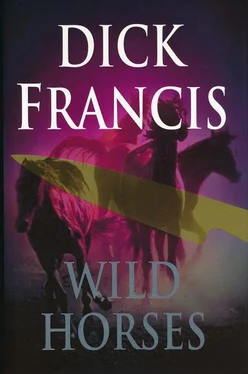A British racing form book, built up week by week throughout the season with loose-leaf inserts tied between soft leather covers, contained details of every single race run, identifying each runner by name, trainer, jockey, weight carried, age and sex, and giving a start to finish commentary of performance.
There was no gainsaying the form book. If the form books said Mr T. Lyon (the Mr denoting amateur status) had finished fifth a long way back, it was no good Mr T. Lyon in memory thinking he’d ridden a close contest to be beaten by half a length. Mr T. Lyon, I read with nostalgia, had won a three-mile steeplechase by two lengths at Newbury, the horse carrying ten stone six. The underfoot conditions that day had been classified as ‘soft’, and the starting price had been 100-6, Mr T. Lyon’s mount having unaccountably beaten the hot favourite (weighted out of it, carrying 20 lbs more). Mr T. Lyon, I remembered, had been ecstatic. The crowd, who’d mostly lost their bets, had been unenthusiastically silent.
I smiled. Here I was, twelve years later, clad in Delta-cast and trying not to be killed: and I didn’t think I’d ever been happier than on that cold long-ago afternoon.
Valentine had put a red exclamation mark against my winner, which meant that he personally had fitted the horse with shoes especially for racing, probably on the morning of the race.
Horses wore thin aluminium shoes for racing, much lighter and thinner than the steel shoes they needed in the stable and out at exercise. Farriers would routinely change the shoes before and after a race.
Owing to chance, the form books in Box III went back only as far as my seventeenth birthday. For the Mr T. Lyon debut at sixteen to turn up, I would have to wait for Lucy.
I opened Box I, Flat racing form books, and found that in this instance the books were older. These, indeed, covered the few years when Jackson Wells had been training in Newmarket: one of them covered the year of Sonia’s death.
Fascinated, I looked for Valentine’s red dots (runners) and red exclamation marks (winners) and found my grandfather’s name as trainer all over the place. Twenty-six years ago, when I’d been four. A whole generation ago. So many of them gone. So many horses, so many races, lost and forgotten.
Jackson Wells hadn’t had large numbers of runners and precious few winners, as far as I could see. Jackson Wells hadn’t had a regular jockey either: only successful wealthy stables could afford to retain a top-flighter. Several of the Wells’ horses had been ridden by a P. Falmouth, several others by D. Carsington, neither of whom I’d heard of, which wasn’t surprising.
On the day of his wife’s death, Jackson Wells had set off to York races where a horse from his stable had been entered. I looked up the actual day and found his horse hadn’t started and was listed as a non-runner. Trainer Wells had been on his way back to Newmarket when they’d run the race without him.
I flicked forward through the pages. Valentine’s dots for Jackson Wells were scattered and diminishing in number. There was only one exclamation mark, a minor race on a minor track, ridden by the minor jockey, D. Carsington.
‘A winner is a winner,’ my grandfather always said. ‘Never despise the lowliest.’
I put the form books back in the box, dutifully collected my guardian shadows from the lobby, and went by car to Betty’s house to ask if she by any chance had Dorothea’s key. She shook her head. Poor Dorothea; that poor man, Paul.
Betty’s husband wasn’t grieving for Paul. If I wanted to start tidying Dorothea’s house, he said, he could open her door in no time. Betty’s husband was an all-round handyman. A little how’s-your-father and a shove, he said, would circumvent most locks, and consequently he and I soon went from room to ravaged room righting the mess as best we could. The police, he said, had taken their photos and their fingerprints and left. The house, such as it was, and crammed with bad memories, was Dorothea’s to come home to.
I spent most time in her bedroom, looking for the photographs she said she kept in a box. I couldn’t find them. I told Betty’s husband what I was looking for — Dorothea’s only mementos of Paul when young — but neither of us succeeded.
‘Poor love,’ Betty’s husband said, ‘That son of hers was a brute, but she would never hear a strong word against him. Between you and me, he’s no loss.’
‘No... but who killed him?’
‘Yeah, I see what you mean. Gives you a nasty feeling, doesn’t it. some geezer running around with a knife?’
‘Yes,’ I said. ‘It does.’
I stood in the dark street outside Bill Robinson’s garage, with the black-belt at my back facing the crowd that had inevitably collected.
There were bright lights inside the garage where Bill Robinson himself stood, dressed in his accustomed black leather and studs and looking self conscious. The monster Harley Davidson stood to one side. Pieces of a second, that Bill was rebuilding, lay in clumps on the drive. Moncrieff was busy pointing arc lamps and spots to give dramatic shadows and gleams, and Nash’s stand-in walked to the designated point and looked towards the garage. Moncrieff lit his profile first, and then a three-quarter face angle, one side bright, the other in darkness, only the liquid sheen of an eye showing.
Nash arrived, walked up beside me and watched.
‘You pause,’ I said. ‘You’re wondering how the hell you’re going to get out of the fix you’re in. You’re psyching yourself up. OK?’
He nodded. He waved a hand towards the scene. ‘It’s striking,’ he said, ‘but why a bike?’
‘It’s what our movie is about.’
‘How do you mean? There aren’t any bikes in it, are there?’
‘Fantasy,’ I said. ‘Our movie is about the need for fantasy.’
‘The dream lovers?’ he suggested doubtfully.
‘Fantasy supplies what life doesn’t,’ I said casually. ‘That boy there with his bike is eighteen, good natured, has a regular job, carries his elderly neighbour’s shopping home for her, and in his fantasy life he’s a hell raiser with roaring power between his legs and the gear and the studs. He’s playing at what he wouldn’t really like to be, but the imagining of it fills and satisfies him.’
Nash stood without moving. ‘You sound as though you approve,’ he said.
‘Yes, I do. A good strong fantasy life, I’d guess, saves countless people from boredom and depression. It gives them a feeling of being individual. They invent themselves. You know it perfectly well. You are a fantasy to most people.’
‘What about serial killers? Aren’t they fantasists?’
‘There’s a hell to every heaven.’
Moncrieff called, ‘Ready, Thomas,’ and Nash, without comment, went to the place from where he would walk into shot, and pause, and turn his head, and watch Bill Robinson live in his courage-inducing dreamland.
Ed went round explaining the necessity of silence to the neighbours. He shouted, ‘Turn over.’ The cameras reached speed. Ed yelled, ‘Action.’ Nash walked, stopped, turned his head. Perfect. Bill Robinson dropped a piece of exhaust pipe out of nervousness and said, ‘Sorry.’
‘Cut,’ Ed said, disgusted.
‘Don’t say “sorry”,’ I told Bill Robinson, walking towards the garage to join him. ‘It doesn’t matter if you drop something. It doesn’t matter if you swear. It’s normal. Just don’t say “sorry”.’
He grinned. We shot the scene again and he fitted two shining pieces of metal together as if he hadn’t got fifty people watching.
‘Cut,’ Ed yelled with approval, and the neighbours cheered. Nash shook Bill Robinson’s hand and signed autographs. We sold a lot of future cinema tickets, and no one stuck a knife in my back. Not a bad evening, overall.
Читать дальше












